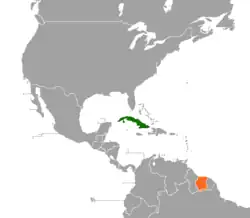 | |
Cuba |
Suriname |
|---|---|
Diplomatic relations between Cuba and Suriname were established on 23 March 1979.[1] Suriname has an embassy in Havana since 2003.[2] Cuba has an embassy in Paramaribo since 1981.[3]
History


After the 1980 Surinamese coup d'état, Fidel Castro was the first head of state to offer his congratulations to Desi Bouterse.[4] Cuba established an embassy in Paramaribo in 1981 which developed into the largest diplomatic mission in Suriname.[3][5] The murder of Maurice Bishop in 1983, and subsequent invasion of Grenada, was followed by the downgrading of the Cuban embassy to a diplomatic post with a chargé d'affaires,[5] and the expulsion of 105 Cuban diplomats and advisors. The National Military Council denied that there was a correlation between the expulsion and the events in Grenada.[6]
In 1998, President Wijdenbosch made a state visit to Cuba, and promised to renew diplomatic relations.[7] In 2006, the Cuban embassy was re-established.[8] In 2011, there was a state visit by President Bouterse to Cuba to discuss trade.[9]
Cuba has sent many medical doctors to Suriname.[10] In 2020, during the COVID-19 pandemic, 50 doctors were dispatched to Suriname.[11] Cuba also provided scholarships and medical education, however the program was cancelled in August 2020.[12] In the 2020s, Cuban refugees increasingly used Suriname as a transit country to the United States.[13] In January 2021, a group of 500 Cubans stranded in South Drain where they were denied access to Guyana from where they had hoped to catch a flight to the United States.[14]
Trade
Trade between Suriname and Cuba is negligible. In 2019, Suriname exported US$242,000 worth of goods to Cuba with the main product being wood. Cuba exported US$318,000 worth of goods with the main product being detonating fuses.[15]
References
- ↑ "Lijst van Diplomatieke betrekkingen en visum afschaffing" (PDF). Surinamese Ministry of Foreign Affairs (in Dutch). Archived from the original (PDF) on 16 April 2019. Retrieved 28 December 2021.
- ↑ "Antonius ambassadeur Suriname op Cuba". Waterkant (in Dutch). 31 March 2021. Retrieved 28 December 2021.
- 1 2 "Ambassadeur van Cuba in Suriname presenteert zich". Amigoe via Delpher.nl (in Dutch). Retrieved 28 December 2021.
- ↑ "Surinaamse leiders koersen naar links militair regime". Reformatorisch Dagblad (in Dutch). 20 March 1982. Retrieved 28 December 2021.
- 1 2 "Felle kritiek op VS-invasie". Amigoe via Delpher.nl (in Dutch). 26 October 1983. Retrieved 28 December 2021.
- ↑ "Bouterse zet 105 Cubanen uit Suriname". Het Parool via Delpher.nl (in Dutch). 31 October 1983. Retrieved 28 December 2021.
- ↑ "Suriname en Cuba halen banden aan". NRC (in Dutch). 15 January 1999. Retrieved 28 December 2021.
Wijdenbosch confirmed that the relationship was severed because of Grenada
- ↑ "Na 23 jaar weer Cubaanse ambassade in Suriname". Waterkant (in Dutch). 1 June 2006. Retrieved 28 December 2021.
- ↑ "Bouterse weer in Suriname na staatsbezoek Cuba". Waterkant. Retrieved 28 December 2021.
- ↑ "Cuba heeft historie van zending medici naar crisislanden". Suriname Herald (in Dutch). Retrieved 28 December 2021.
- ↑ "Suriname krijgt ondersteuning van vijftig Cubaanse gezondheidswerkers voor COVID-19". Suriname Herald (in Dutch). Retrieved 28 December 2021.
- ↑ "Medische studenten Suriname worden teruggehaald uit Cuba". Suriname Herald. Retrieved 28 December 2021.
- ↑ "Het martelaarschap van Cubanen". Dagblad Suriname (in Dutch). Retrieved 28 December 2021.
- ↑ "Vluchtelingen moeten regering niet onder druk zetten". Dagblad De West (in Dutch). Retrieved 28 December 2021.
- ↑ "Suriname/Cuba". Observatory of Economic Complexity. Retrieved 28 December 2021.
